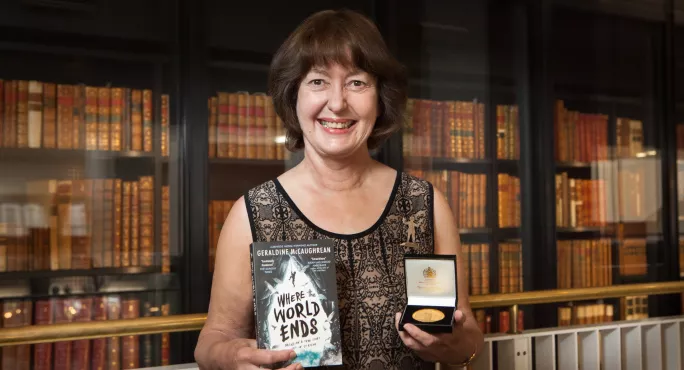- Home
- Geraldine McCaughrean wins Carnegie book award
Geraldine McCaughrean wins Carnegie book award

Children’s author Geraldine McCaughrean has won the prestigious Carnegie Medal for the second time - 30 years after her first win.
The medal, the UK’s oldest and most prestigious children’s book award, is followed by thousands of school and book groups around the country who shadow the awards by reading, discussing and reviewing the shortlisted books.
Ms McCaughrean, the most shortlisted author in the history of the prize, was given the award for her book Where the World Ends - a story inspired by a historical record from the 18th century about a group of men and boys who were stranded on rocks in the sea after their rescue boat failed to arrive.
She first won the prize in 1998 for her novel A Pack of Lies.
At the same ceremony in London today, Canadian illustrator Sydney Smith was awarded the Kate Greenaway Medal for his illustrations in Joanne Schwartz’s Town is by the Sea, which shows the life of a boy growing up in a coal mining town in the 1950s.
Amnesty International also awards commendations to an author from each of the Carnegie and Kate Greenaway medal shortlists.
‘Let’s bombard children with words’
Debut author Angie Thomas, who was shortlisted for the Carnegie Medal, won the Amnesty Honour commendation for her young adult book The Hate U Give, which follows the experience of a 16-year-old girl after her friend is shot by a white police officer. It was inspired by the Black Lives Matter movement.
And Levi Pinfold, shortlisted for the Kate Greenaway Medal, won the Amnesty Honour commendation for his black and white illustrations in The Song from Somewhere Else by A F Harrold. The book explores friendship, betrayal and doing what’s right.
Ms McCaughrean won the Carnegie Medal from a shortlist of eight authors.
In her acceptance speech, she was expected to stress the importance of children learning as rich a vocabulary as possible.
“It’s been said often in recent years that ‘literary’ fiction for young people has had its day,” she was due to say. “In my opinion, young readers should be bombarded with words like gamma rays, steeped in words like pot plants stood in water, pelted with them like confetti, fed on them like Alphabetti Spaghetti, given Hamlet’s last resort: ‘Words. Words. Words’.”
She was expected to add: “The worst and most wicked outcome of all would be that we deliberately and wantonly create an underclass of citizens with a small but functional vocabulary: easy to manipulate and lacking in the means to reason their way out of subjugation, because you need words to be able to think for yourself.”
Where the World Ends was described as “outstanding” by Jake Hope, chair of the judging panel.
The other shortlisted authors for the Carnegie Medal were Patrick Ness for Release, Marcus Sedgwick for Saint Death, Angie Thomas for The Hate U Give, Lauren Wolk for Beyond the Bright Sea, Lissa Evans for Wed Wabbit, Will Hill for After the Fire and Anthony McGowan for Rook.
There were seven illustrators on the Kate Greenaway award shortlist. The other shortlisted authors were: Debi Gliori’s Night Shift, Pam Smy’s Thornhill, Britta Teckentrup for Under the Same Sky, Levi Pinfold for The Song from Somewhere Else, Laura Carlin for King of the Sky and Petr Horáček for A First Book of Animals.
The Carnegie Medal was first awarded in 1936. Past winners include CS Lewis, Philip Pullman, Meg Rosoff and Sally Gardner. The Kate Greenaway Medal has been won by Shirley Hughes, Anthony Browne and Quentin Blake. It was first awarded in 1956. The awards are sponsored by CILIP (the Charted Institute of Library and Information Professionals).
Last year, the Carnegie Medal went to 49-year-old music manager-turned-novelist Ruta Sepetys for Salt to the Sea, a novel that explores the events leading up to the sinking of the Wilhelm Gustloff, the worst maritime disaster in history in which over 9,000 people, mainly refugees, perished.
Lane Smith, a US artist and author, won the CILIP Kate Greenaway Medal last year for his illustrations in There is a Tribe of Kids about the power of collective nouns and the importance of play and exploration.
Keep reading for just £1 per month
You've reached your limit of free articles this month. Subscribe for £1 per month for three months and get:
- Unlimited access to all Tes magazine content
- Exclusive subscriber-only stories
- Award-winning email newsletters



